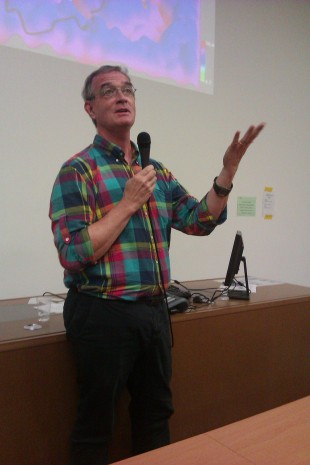
Den digitale pasienten: Slutt på Middelalderens Medisin?
Foredrag ved professor Stephen Friend, Sage Bionetworks, Seattle.
Minnetale over Olav Riste ved Rolf Tamnes
Den digitale pasienten: Slutt på Middelalderens Medisin?
I dagens medisin er det en asymmetri mellom lege og pasient, i den forstand at pasienten er en passiv mottaker av informasjon og behandling. Pasienten representerer en dårlig utnyttet ressurs som er villig til og i stand til å bidra betydelig til både diagnostikk og behandling. Kontinuerlig tilbakemelding fra individuelle pasienter kan gi betydelige bidrag og endre vår tilnærming til både diagnostikk og behandling. Det har blitt utviklet 'app'er som pasienter kan bruke til å rapportere til forskere og til sine leger. Potensialet for slik rapportering er stort for sykdommer som diabetes, Alzheimer, Parkinson, kreft, flere sjeldne tilstander og syndromer og til og med søvnproblemer. Publikum bør ha en rolle både som finansiører, understøtting av forskning og som pasienter. Friend vil presentere sitt nyskapende arbeid med å lage bærbare, elektroniske enheter for enkel rapportering av viktige parametre og diskutere hvordan en slik utvikling kan bringe diagnostikk og klinikk fra Middelalderen og over i Opplysningstiden.
The digital patient: Exiting the Age of Priestly Medical Advice
Abstract:
There is currently an asymmetry between physician and patient, but the patient is both willing and able to contribute significantly to diagnosis and treatment. The public should act as funders, researchers and patients. Continuous feedback from individual patients will change how we assess disease. This has been exemplified by patient-operated "apps" which allows patients to act as experimentors. The potential is great for diseases such as diabetes, Alzheimer's, Parkinson's, cancer, rare diseases and syndromes, and even sleep disorders. Friend will be talking about his recent work on wearable devices and how this move might bring diagnostics and clinical medicine from the dark ages into enlightment.
Stephen Friend is the founder and President of Sage Bionetworks (2009). He has dedicated his career to untangling the complex ways that our genes, our environments, and our choices combine to form our health. Gaining his MD PhD, he did his clinical training at Harvard while leading a team to clone the first tumor suppressor gene working at the Whitehead (MIT). He has pursued his passion from academic research while on the faculty at Harvard through entrepreneurial success (Rosetta Inpharmatics) and through being a SVP for Oncology at Merck & Co., Inc. At Sage Bionetworks, he has built an organization that connects a new way of doing scientific data analysis online to new methods for engaging citizens directly into previously closed research processes. Under his leadership, Sage Bionetworks develops technology platforms for data-intensive analysis, governance platforms for data sharing and re-use, runs challenges to solve complex biomedical problems, and performs cutting edge computational biology and research. Most recently has co-led "The Resilience Project" with Eric Schadt and Jason Bobe that looks for protective genes in apparently healthy individuals, and turned to projects in mHealth where he coordinates Sage's efforts on several of Apple's Open Source ResearchKit apps including the building of these apps and the building out of the back-end so that qualified researchers worldwide can share their data on "Synapse" which is an Open Biomedical Research Platform.